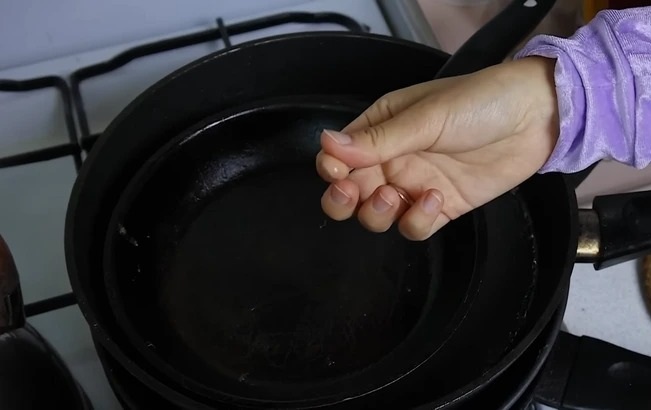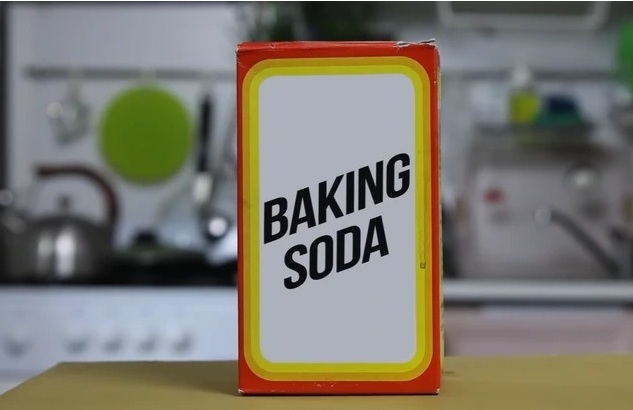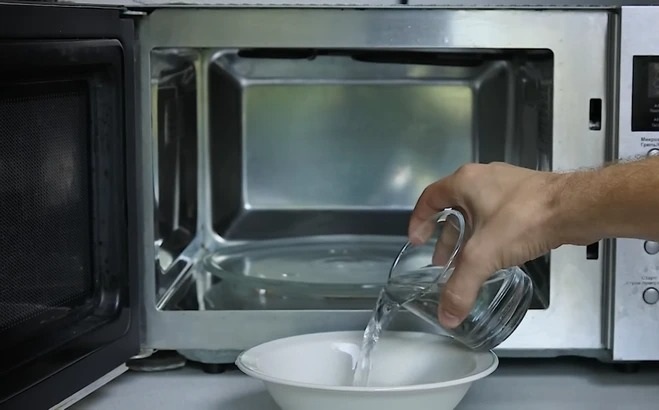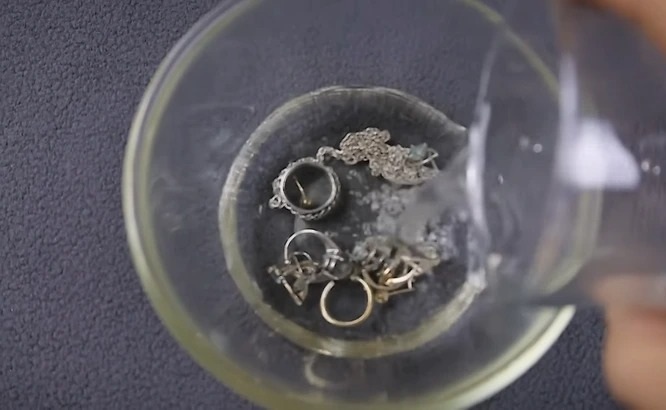Garlic is not only a great food additive and vampire repellent, but it also has cleansing properties that can make your bathroom more tolerable. Freshly crushed garlic cloves contain antimicrobial properties, particularly allicin, which reduces the build-up of bacteria and fungi.
These natural cleansing properties of garlic can help you avoid the need to constantly clean your toilet. Simply crush up a piece of garlic and put it into your toilet bowl before going to bed. The next morning, flush the toilet and let allicin do the cleaning for you. Doing this twice a week will ensure a very clean toilet bowl.

Hair, grease, and grime can build up over time and clog drains. However, you can easily remove the blockage using salt and vinegar. In a small bowl, mix 1 cup of vinegar and 1 cup of salt until evenly combined. Pour the mixture into the drain and wait for 15 to 30 minutes, depending on the severity of the clog. This method will save you money and effectively unclog your drain. To further ensure a clear and odor-free drain, add 3 ½ ounces of baking soda. Boil 6 ounces of water and mix in 1 cup of vinegar. Pour the baking soda into the drain, followed by the boiling water and vinegar mix. Let it sit for an hour, and then the blockage and smell will be gone.

Scorched pans can be difficult to clean, but you can make the process easier with the right ingredients. Fill your pot or pan with water and add about 1 cup of vinegar. Bring the liquid to a boil, then remove the pan from the heat before it completely dries up, leaving a small amount of liquid remaining. Sprinkle baking soda on the base, covering the burnt parts. Watch as the soda fizzes and continue to move the pan around to cover the scorched areas. Once the fizzing stops, you can scrub away the residue. Vinegar can also be used for many other purposes.
A couple of teaspoons mixed with water in a spray bottle can easily remove salt stains from shoes. Pour white vinegar into a container and place rusty tools inside. Let them soak overnight, and the vinegar will eat away at the rust. After 24 hours, you can easily remove the corrosion by wiping it.

Baking soda is also effective in removing foul odors from furniture and carpets. It absorbs acidic odors within a covered area. Spread a generous amount of baking soda on the required area and leave it for at least an hour, or overnight for best results. Then, simply vacuum it up.
Charcoal is even better at removing odors and a wider variety of particles. However, you don’t want to deal with black stains from the charcoal. Instead, put charcoal in air freshener sachets and hide them underneath cushions for the desired effect without the mess.

Vinegar has various cleaning uses due to its acetic acid content, which is more powerful than other natural ingredients like coffee and orange juice. Vinegar goes through a double fermentation process, converting simple sugars into ethanol using yeast. The ethanol then turns into acetic acid, which can dissolve mineral deposits and be used on many surfaces without causing damage. It is beneficial for cleaning, removing stains, and polishing copper, brass, bronze, and silver. You can even give your dishwasher an extra boost with a natural cleanse by placing half a bowl of white vinegar on the top rack before starting the machine.

You can easily clean your microwave by combining 2 cups of water with ¼ cup of lemon juice in an open dish. Run the microwave on high for 8 minutes. The steam from the solution will be absorbed into the crusty layers within the microwave, making it easier to clean and leaving a fresh lemony smell.
Using the oil of cloves and cinnamon, you can soak cotton balls in them and place them in small bags inside your closet to repel moths and other insects. You can also create your own humidifier in the winter by filling a can two-thirds of the way with water and adding cinnamon sticks, cloves, and orange peel. Place it on the stove, and as it adds moisture to the air, it will provide a soothing scent.
If you have scratches, nicks, or marks on wooden furniture, you can use a pecan to re-stain the damaged area. Simply rub the pecan on the scratched area.

If your stainless-steel cutlery and other flatware have lost their shine, you can restore it by putting them in a small pan filled with carbonated water. Let them sit until the bubbles have completely gone flat. Once removed and wiped down, the steel will shine as good as new.
Add witch hazel to the water-fill in your iron to replace the stale smell with a sweeter, fresher scent as you iron your clothes.
For difficult corners of furniture where a vacuum cleaner can’t reach, use a paintbrush to easily remove the build-up that has escaped the suction for so long.
If you have chewing gum stuck on your finger or in your hair, rub vegetable oil on it and leave it for a few minutes until you can easily remove it.

Ammonia is safe for the environment but can be harmful to the skin. However, it has extensive cleaning uses. To clean your oven, pour a cup of household ammonia into a small bowl and leave it overnight in the oven (make sure the oven is off). The next morning, wipe it down using a damp cloth. You’ll appreciate the difference as you easily clean the grime from the hardest places to wash. Ammonia is also effective for making tiles sparkle like new and removing mildew in the bathroom. Use ¼ cup of ammonia per gallon for these tasks.
Running half a lemon down the side of a cheese grater will effectively remove sticky food particles. Remember to wash with water afterward to ensure a more effective cleanse and keep your fingers safe from cuts. You can also save the juice from the lemon as a natural substitute for bleach. Use just ½ cup of lemon juice per gallon to soak clothes for at least an hour, then dry them in the sun. The same volume can be used in a washing machine to brighten colors and bleach whites.

You can sanitize your earrings by using 1 tablespoon of lemon juice in 1 and a half cups of water. However, avoid putting gold and pearls in this solution, as they are sensitive to the acids found in lemons.
When washing cast iron pans after cooking, apply olive oil and a bit of salt to remove debris and reduce the effects on the surface of the pan, extending its usage. The same method, without salt, can be used to remove stains on stainless steel benches and ovens. Gently clean with a small amount of olive oil in a circular motion to remove charred fragments and restore shine.
Olive oil, along with other cold-pressed oils, can also repair scratches, restore color, and reduce general wear and tear on leather furniture. Dab a small amount of olive oil on a cloth and gently rub it in. Olive oil is a safe and natural alternative to chemicals due to its antimicrobial properties. Tea tree oil, with its antiviral and antifungal properties, has even more benefits. By using distilled water in a spray bottle with a few drops of olive oil, you can create your own ready-to-use all-purpose cleaner.

